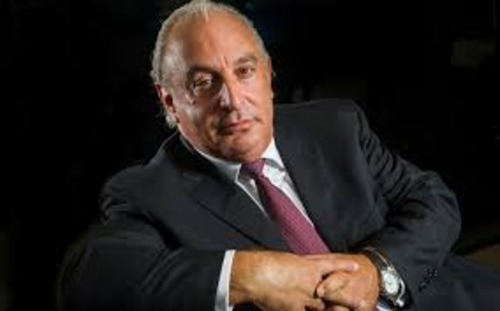- Home
- Billionaires
- Investing Newsletters
- 193CC 1000
- Article Layout 2
- Article Layout 3
- Article Layout 4
- Article Layout 5
- Article Layout 6
- Article Layout 7
- Article Layout 8
- Article Layout 9
- Article Layout 10
- Article Layout 11
- Article Layout 12
- Article Layout 13
- Article Layout 14
- Article Sidebar
- Post Format
- pages
- Archive Layouts
- Post Gallery
- Post Video Background
- Post Review
- Sponsored Post
- Leadership
- Business
- Money
- Small Business
- Innovation
- Shop
Recent Posts
Philip Green: The Rise and Fall of a British Retail Mogul

Philip Green, a once-celebrated figure in the British retail sector, rose to fame as the mastermind behind some of the most iconic high street brands in the United Kingdom. Over decades, his name became synonymous with retail innovation, luxury, and controversy. As the former chairman of the Arcadia Group, Green oversaw a retail empire that included Topshop, Topman, Dorothy Perkins, Burton, and other major brands. However, his career has also been marked by high-profile scandals, financial challenges, and a dramatic fall from grace.
Born on March 15, 1952, in Croydon, England, Philip Green grew up in a middle-class Jewish family. His father passed away when he was 12, leaving his mother to raise him and manage the family finances. Green left school at the age of 15 and started his career in retail by working for a shoe wholesaler. This early exposure to the fashion and retail industry laid the foundation for his entrepreneurial ambitions.
In the 1970s, Green began importing jeans from the Far East and selling them to retailers in the UK. His knack for identifying trends and understanding the demands of the fashion market helped him build a reputation as a savvy businessman. By the age of 33, he had acquired his first retail company, Jean Jeanie. Over the next two decades, Green expanded his portfolio, acquiring undervalued retail businesses and turning them into profitable ventures.
Green’s career reached new heights in 2002 when he acquired the Arcadia Group for £850 million. Arcadia owned a suite of well-known brands, including Topshop and Topman, which became flagship names under Green’s leadership. Topshop, in particular, became a global phenomenon, attracting a younger audience with its trendy designs and high-profile collaborations, including partnerships with supermodel Kate Moss.
At the peak of his success, Philip Green was celebrated as a retail tycoon and was knighted in 2006 for his services to the fashion industry. However, his reputation began to unravel in the years that followed.
In 2015, Green sold British Home Stores (BHS) for just £1 to a consortium led by Dominic Chappell, a former bankrupt businessman. The sale raised eyebrows, but the true extent of the fallout became apparent in 2016 when BHS collapsed, leading to the loss of 11,000 jobs and putting the pensions of 19,000 workers at risk. The BHS pension scheme was left with a £571 million deficit, sparking public outrage and calls for accountability.
Green faced intense scrutiny from the media, regulators, and the British Parliament. A parliamentary inquiry into the collapse of BHS described Green as the “unacceptable face of capitalism.” Members of Parliament (MPs) voted to strip him of his knighthood, although the vote was symbolic, and Green remains a knight. Under pressure, Green eventually agreed to pay £363 million into the BHS pension scheme in 2017, but the damage to his reputation was irreparable.
The financial troubles of Arcadia Group further tarnished Green’s legacy. In 2020, the group filed for bankruptcy, citing the impact of the COVID-19 pandemic and the rise of online shopping as key factors. The collapse of Arcadia led to the sale of its most iconic brands, including Topshop, Topman, and Dorothy Perkins, to online retailer ASOS. Thousands of employees lost their jobs, and the once-dominant retail empire was dismantled.
Green’s wife, Cristina Green, played a significant role in the family’s business affairs. As the legal owner of the Arcadia Group through the family’s offshore company, Cristina was often in the spotlight alongside her husband. The couple, who have three children, have faced criticism for their lavish lifestyle, which contrasts starkly with the financial struggles faced by their former employees.
Despite the controversies, Philip Green’s story is one of resilience and ambition. His early success in the retail industry and his ability to turn around struggling businesses earned him recognition as one of Britain’s most influential entrepreneurs. However, his legacy is overshadowed by the scandals and financial mismanagement that marked the later years of his career.
Today, Philip Green lives a relatively private life, reportedly spending much of his time in Monaco, where the family enjoys tax benefits. While his business empire may have crumbled, Green’s influence on the British retail landscape remains undeniable. His rise and fall serve as a cautionary tale about the complexities of modern capitalism, the responsibilities of leadership, and the impact of ethical lapses on public trust.
As the retail industry continues to evolve, Green’s story is a reminder of the importance of adaptability, integrity, and the need to balance profitability with social responsibility. While his achievements cannot be overlooked, his legacy will likely remain a subject of debate for years to come.
- Arcadia Group
- BHS collapse
- BHS pensions
- British capitalism
- British fashion
- British Home Stores
- British knighthood
- British media scrutiny
- British retail
- Burton
- Business Ethics
- COVID-19 impact on retail
- Cristina Green
- Dorothy Perkins
- fashion collaborations
- fashion industry
- financial scandals
- high street brands
- leadership accountability
- luxury lifestyle
- Mikhail Chappell
- Monaco lifestyle
- Online Shopping
- pension deficit scandal
- pension scandal
- Philip Green
- Philip Green biography
- Philip Green knighthood
- retail acquisitions
- retail bankruptcy
- retail cautionary tale
- retail collapse
- retail controversies
- retail diversification
- retail empire
- retail entrepreneurship
- retail industry challenges
- retail innovation
- retail legacy
- retail mismanagement
- retail mogul
- retail scandals
- Retail Trends
- retail tycoon
- Topman
- Topshop
- Topshop Kate Moss
- UK business scandals
- UK Parliament
- UK retail history
Recent Posts
Categories
- 193cc Digital Assets2
- 5G1
- Aerospace & Defense46
- AI37
- Arts3
- Banking & Insurance11
- Big Data3
- Billionaires446
- Boats & Planes1
- Business328
- Careers13
- Cars & Bikes76
- CEO Network1
- CFO Network17
- CHRO Network1
- CIO Network1
- Cloud10
- CMO Network18
- Commercial Real Estate7
- Consultant1
- Consumer Tech180
- CxO1
- Cybersecurity68
- Dining1
- Diversity, Equity & Inclusion4
- Education7
- Energy8
- Enterprise Tech29
- Events11
- Fintech1
- Food & Drink2
- Franchises1
- Freelance1
- Future Of Work2
- Games141
- GIG1
- Healthcare78
- Hollywood & Entertainment186
- Houses1
- Innovation42
- Investing2
- Investing Newsletters4
- Leadership65
- Lifestyle11
- Manufacturing1
- Markets20
- Media193
- Mobile phone1
- Money13
- Personal Finance2
- Policy567
- Real Estate1
- Research6
- Retail1
- Retirement1
- Small Business1
- SportsMoney33
- Style & Beauty1
- Success Income1
- Taxes2
- Travel10
- Uncategorized8
- Vices1
- Watches & Jewelry2
- world's billionaires415
Related Articles
Robert Kraft: From Paper Fortune to Sports Empire
Robert Kraft is a name that resonates with success in both the...
By 193cc World's BillionairesDecember 22, 2024Donald Newhouse: A Legacy of Media Influence and Business Leadership
Donald Newhouse, a name synonymous with media moguls and influential business figures,...
By 193cc World's BillionairesDecember 22, 2024Ricardo Salinas Pliego: A Legacy of Business Innovation and Family Success
Ricardo Salinas Pliego is a name that resonates in the world of...
By 193cc World's BillionairesDecember 22, 2024Judy Love: A Legacy Built on Hard Work and Family
Judy Love’s name is synonymous with one of the most successful and...
By 193cc World's BillionairesDecember 22, 2024















Leave a comment